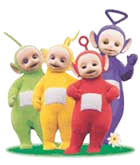Teletubbies
| Teletubbies | |
|---|---|
  The show's logo (top) and main characters (bottom). From left to right: Dipsy, Laa-Laa, Po, and Tinky Winky. | |
| Format | Children's television series |
| Created by | Anne Wood Andrew Davenport |
| Developed by | Ragdoll Productions for BBC Television |
| Starring | Dave Thompson Mark Heenehan Simon Shelton John Simmit Nikky Smedley Pui Fan Lee |
| Narrated by | Tim Whitnall Toyah Willcox Eric Sykes Rolf Saxon |
| Opening theme | 'Teletubbies say "Eh-oh!"' |
| Country of origin | United Kingdom |
| Language(s) | English |
| No. of seasons | 4 |
| No. of episodes | 365 (List of episodes) |
| Production | |
| Executive producer(s) | David G Hiller Vic Finch |
| Running time | 25 minutes |
| Broadcast | |
| Original channel | BBC |
| Original run | 31 March 1997 – 5 January 2002 |
Teletubbies, particularly notable for its high production values, rapidly became a critical and commercial success in Britain and abroad and won a BAFTA in 1998.[3] Teletubbies Everywhere was awarded "Best Pre-school Live Action Series" at the 2002 Children's BAFTA Awards.[4]
Although the programme is aimed at children between the ages of one and four, it had a substantial cult following with older generations, mainly university and college students.[5] The mixture of bright colours, unusual designs, repetitive non-verbal dialogue, ritualistic format, and the occasional forays into physical comedy appealed to many who perceived the programme as having psychedelic qualities. Teletubbies was controversial for this reason. Other critics felt the show was insufficiently educational.[3]
The programme was also at the centre of a controversy when American televangelist and conservative pundit Jerry Falwell claimed in 1999 that Tinky Winky, one of the Teletubbies, was a homosexual role model for children. Falwell based this conclusion on the character's purple colour and triangular antenna; both the colour purple and the triangle are sometimes used as symbols of the Gay Pride movement.[6] 'Teletubbies say "Eh-oh!"', a single based on the show's theme song, reached number 1 in the UK Singles Chart in December 1997 and remained in the Top 75 for 32 weeks, selling over a million copies.
Tidak ada komentar:
Posting Komentar